- Home
- Cecil Beaton
The Parting Years (1963-74) Page 12
The Parting Years (1963-74) Read online
Page 12
Perhaps Miss West likes to preserve every dollar she has earned. She seems quite contented, or so it appeared from my short glimpse of her during the afternoon photographic session. Miss West’s entourage consisted of about eight people from the studio, her own Chinese servant, and her bodyguard, Novak, an ex-muscleman. She was in the bedroom. She had ‘finished her eating’ and was feeling ‘most uncomfortable’. She had put on weight over the holidays and her dresses would not fit. She was rigged up in the highest possible fantasy of taste. The costume of black with white fur was designed to camouflage every silhouette except the armour that constricted her waist and contained her bust. The neck, cheeks and shoulders were hidden beneath a peroxide wig. The muzzle, which was about all one could see of the face, with the pretty capped teeth, was like that of a nice little ape. The eyes, deeply embedded and blacked, were hardly visible. She smiled like an automaton. She gurgled at the compliments. She seemed shy and nice, and sympathetic. When I told her that Lady Sitwell had seen her at a party dressed all in white looking like a vestal virgin, she pretended to be shocked.
She moved very slowly into the living-room and stood — she could not sit — on very high heels. She stroked her yellow fronds of borrowed hair with fat, pointed fingers on which a dozen false diamond rings sparkled: her fingernails grown to several inches in length. She preened and her audience gasped with admiration.
‘Oh, Miss West, you have never looked so beautiful — the lighting is so soft.’ Miss West chortled.
As a prop, a young Adonis, a former athlete from the local university, Tom Shelleck, had been corralled from the film studio to be included in the photographs; a more outrageous combination could not be imagined, this beautiful, young, spare, clean, honest specimen of American manhood, and the pourriture of this old ‘madame’.
She has a sense of humour and is able to laugh at herself. I liked her twinkle; and her vulnerability.
When the whole thing was over she started to walk, but teetered and I caught her just in time. By now, the apartment had become too cloying and airless and I escaped.
The most important thing about Mae West is her genuine belief in herself. She is not putting on an act. Lying on her bed and looking up at herself in the ceiling mirror, she says: ‘You can see that you are a queen,’ and she believes she is a queen.
She looks after herself well, living on health foods, and has become interested in the occult. She says she has extra-sensory perception. She has a few intimate friends who depend on her.
Recently the young generation has discovered her films and she has had a tremendous ‘come-back’.
I told her Prince Charles had thought her ‘Chick-a-Dee’ was the funniest thing he’d ever seen. ‘What a pity he saw me with W. C. Fields! I wish he’d seen me in something else. Well, goodbye dear and I hope we meet again.’
San Francisco
It was a drizzly day outside and we decided this would be a good occasion to ‘take our trip’, my friend on mescalin, me on LSD. Having taken our pills, we hurried out to do provision shopping at the Safewaymarket. Suddenly, everything became more brilliantly coloured; the packages of food became incandescent, the fruits tremendously red, the vegetables electric green, and the cabbages purple. We were in splendid spirits and arrived home to a particularly glowing kitchen. The little sitting-room was a dark cavern.
Now things began to happen! Reality was only there in fits and starts; all was changing and glowing and moving. There was a moment of terror. My companion was unrecognizable, his beard made his face into a square loaf of bread. The fuzz was horrible. I dare not look at myself. I wanted to feel as if my appearance did not exist, but when I did steal a glance, my mother came back with her wild, white hair and long, long nose. My eyes were incredibly blue and my skin all dappled pinks. I felt a bit quivery and shook like a dog coming out of the water, and I sweated. But I gave into the pleasure of it and had no qualms or doubts. My friend was there to guide me and we were completely happy with one another. In a mirror above me was an extraordinary, blowing sea god, a Triton, with full cheeks and huge, curved mouth, blowing the winds away or spouting forth water; a young sea god riding the waves. My friend’s complexion had turned dark red, blotched with green-yellow; his eyes dark puce, his tongue almost black.
Then suddenly a very strange hallucination took place when the water god was reborn and I helped him out of the womb. This scene was enacted at great length.
The daylight fading was an indication that five or six hours had passed. By degrees reality was returning but it was not unpleasant. In fact we laughed a lot. Then hunger took control and I have never enjoyed two fried eggs more, nor had coffee ever tasted better. Very soon night was upon us and sleep was deep.
Sunday
No ill-effects. We were relaxed and content. My friend took me to the Methodist Chapel for Sunday morning service. It was a kind of revivalist meeting. The congregation was made up of clean laundered hippies and negroes, mostly young people who came for a pleasant ‘work out’ and a ‘get-together’ in a Christian frame of mind.
The place gradually became packed with hundreds standing at the back of the hall and in the aisles. A rock group started to play, everybody sang, the gaiety was contagious and the entire congregation started clapping in rhythm. A psychedelic screen above the altar flashed all kinds of things, a close-up of a girl’s tongue on which an acid pill was poised, and the information that Eichmann was still alive. Jesus Christ was referred to as our Director. Songs by Dylan and from Hair were sung. The volume of noise became unbearable. For one-and-a-half hours a condition of euphoria was sustained.
We all linked arms and swayed from side to side in a state of jazzed-up emotion; a new religion?
PERU
February 19th, 1970
The train to Machu Picchu rose above Cuzco, then slowly descended among clumps of eucalyptus, a recent addition to the country, pampas, lupins and broom in bloom; the natives on their farms were looking after their herds, running with bundles on their backs, never idle, the women spinning white wool in dark hands. In stature squat and small, they are not beautiful; their faces are plain and open, and I feel they would never be menacing. At station stops, families in mud huts had grown a few button-shaped roses, beneath which ducks and hens struggled in the mud. Life was at its most basic here; a mother would come out of her doorway with breasts hanging out of her cotton blouse and one felt that birth and lust was all very much a part of existence. Mercifully the rich red soil is extremely fertile so that almost everything grows in abundance and the fruit is quite luxurious.
The train seats were harder with each hour and gradually the laughter of the American photographer became irritating. In order not to say the obvious, I became silent. No oil is poured and I am very English and morose, even unfriendly, except to my friends.
The river gorges became deeper and rougher, the brown-coloured water gushing with enormous force. A scene of great wonder!
By now the fertile, craggy landscape had become more Wagnerian, the slopes more precipitous; one marvelled to see cattle grazing at such a height and at such an angle; paths made by the Incas centuries ago could be plainly discerned on these perilous inclines. The jungle had encroached right up to the river bank; orchids, cacti, wild gladioli and all kinds of lush vegetation; a dark green Rousseau world in which it would be easy to get lost or overcome by unknown misfortunes.
On arrival at the base of the mountain we were driven at maniacal speed by a local guide in a truck. The American photographer continued to shriek with laughter but those of us who were on the roof holding on for dear life, and the passengers inside, were terrified and we all complained bitterly: ‘We did not come here to be killed.’ The road was so precarious that if the truck had skidded we would have been pitchforked thousands of feet down into the Urubamba River.
Machu Picchu was a wonderful spectacle. It was in 1912 that Hiram Bingham, exploring and collecting butterflies, left his guides and came upon this mountain-peak
village which even the Spanish conquerors had never found. He discovered a farming community living on the site of an Inca religious centre where there were temples for the worship of the sun, and temples where ‘sacred’ virgins had been sacrificed, whose remains were unearthed centuries later. It was also thought that there might be gold there.
The whole complex of fortress buildings is of steep terraces built into the green mountainsides and walled with granite. One flight of steps is like a wild oriental Versailles. The day we were there, vast thundery clouds hovered low over the mountains. Some fellow-tourists were adventurous enough to climb the peak of Hyayna Picchu, a half-hour effort in this exhausting climate and quite perilous. I felt tired and conscious that at this height one’s energy is severely restricted. None the less we scampered with the guide like mountain goats, took pictures and were duly impressed by the walled-in rooms for storage or worship, the staircases, and roofless or thatched houses.
This is doubtless one of the wonders of the world and I am pleased to have made the effort to see it, but I must confess that it appeared to me no more extraordinary than Christophe’s citadel in Haiti.
February 22nd
Off to Puno to see the market, a well-known sight and one that surpasses all expectations. Two tall trees, covered with hanging moss, make the picture, but the dark reds and navy blues of the women’s costumes are an essential part.
The road to Puno, along a fertile plain with craggy mountains each side, was of extraordinary beauty, lush with big bushes of broom in flower, and another yellow-flowering bush like an acacia dotted the river bank. This is by far the most beautiful part of the country we have seen and, encouraged, we decided to go on to Ollantaytambo to see the Inca ruins.
The churches en route were shut; but one baroque church in an empty landscape of blue mountains was an exception; a woman carrying a child produced keys to this deserted, wonderfully romantic, somewhat English-Renaissance-looking building with twin castellation decorations, a doorway carved with archaic angels, and donkeys, geese and dogs on the green sward.
BOLIVIA
February
The town of Sucre seemed primitive and crude. On arrival at the tourist hotel our spirits went to the bottom; a new, dirty, untidy, empty hotel; flies thick on the hors d’oeuvres already put out on the various dirty tableclothed tables. The vegetable soup was possible but I didn’t feel I could eat any of the other dishes without having an upset stomach for a month. Sleep in my revolting bedroom was welcomed.
At the appointed time, Mrs Costa arrived from the Tourist Bureau, an ugly woman with a broad mouth and too many teeth. She had had a hair-do and a manicure and proved an excellent guide, and though one of the new poor, and living a very simple life, seems not sorry for herself.
She took us into the church to see the famous Madonna which is covered with valuable trinkets given by faithful believers; diamonds, emeralds, brooches shaped like dragons and birds of the eighteenth century, thousands of pearls and watches; the result quite moving but hideous.
We visited the cathedral which is Austrian baroque, white marble and with huge gilt altars and pulpits. There are several churches, all gilt and of an exceptional grandeur for the smallness of this town. I was pleased to see a number of old houses with stucco decoration and pretty wrought-iron balconies. The present economy of the country is bad; the rich have been stripped of their wealth, and there is no tourist trade, so life is reduced to a very low level. There are no attractive shops; an old building that should have been an elegant, decorative store sells only spare parts of alarm clocks or odd bits of machinery. The coloured photographic portraits in one shop might have been made in 1890. The poor people look healthier than in La Paz, more open, with nice expressions, friendly to one another and to strangers.
One market was full of the usual Japanese junk, but the people were fascinating, and the women wore trilby hats. Through a dark tunnel, filled with witch doctors and a blind fanatic reciting his prayers in non-stop fervour, there was another market. This was beautiful, with wonderful fresh foodstuffs, vegetables and fruit and grain, in baskets or huge earthenware bowls. There were flowers too, marguerites and tuberoses. We returned to the hotel restaurant for lunch. The soup was only warm water, highly seasoned curry of tripe, very bad potatoes, veal like cement wafers, and the coffee undrinkable. Beer was good and on this we retired, took sleeping pills and shut out the world.
PLAY-GOING
London: 1970
After the desert of Broadway, an added pleasure to my return home was to find that play-going can be such a treat. On three consecutive nights the theatre in London offered me great delights.
The first consisted of the acting, particularly by Irene Worth, and the direction of Albee’s Tiny Alice; the play I first saw in San Francisco was as remote as ever on this second visit, but David Warner’s performance was masterly. He has acquired maturity. He has gained depth and his performance was full of variety and even in such a solemn part, a great deal of humour.
The next play was Donald Howarth’s Three Months Gone. I have always known him to be a tender and sensitive man of rare talent. It is possible to imagine that now, after several failures, this one — strangely enough, as it is an obscure and curious play — will be a popular success. This play, too, was miraculously acted by Jill Bennett, not a favourite of mine normally, and even more remarkable was the timing, reticence and reality of Diana Dors. However, of all the theatre joys at this time, nothing could compare with the production of Uncle Vanya. It was the best version of any Russian play I’ve ever seen. I have never known such remarkable acting. People behaved and sounded off in ways I’ve never seen on the stage before and yet the effect was realistic.
The performances of Paul Scofield, Colin Blakely and Anna Calder-Marshall made one feel that actors have seldom before shown us that imaginative, inspired acting is choreographic in its feeling, and musical in the sense that human beings sound differently when under various emotions. At one moment Scofield, embarrassed and harassed at making a half-hearted love declaration, moved his arms in the air like a cat fighting. It was a little gem of observation. Intense in the scene of hysterical exasperation, he did marvellous things with his hands flat upon his bowed head. His voice lost its mechanical strangeness but sounded as if he were thinking and saying things for the first time. I admire and respect him as an actor of integrity and quality. He has none of the coarseness and vulgarity of some actors, and the adulation of the critics, students, and general public alike is absolutely deserved.
Colin Blakely, showing his forestation diagrams, put on the childlike ‘explaining’ voice. Then when he said, ‘You’re so beautiful’ to Yeliena, it was as if, in his passion, he had invented the words. There has never been a better Sonya than Anna Calder-Marshall’s. We suffered with this little gauche creature who had no self-pity. It was a masterpiece of true observation and feeling.
The director had chosen the perfect actors for each part. The nurse was absolutely ‘right’; the grandmother of Gwen Frangçon Davies was a powerful presence. To see her with spectacles and ringed fingers reading a book on a sofa was to be spellbound, and when she altered her position on that sofa, the whole play took on new life.
The scenery was just as it should be, almost non-existent yet full of atmosphere. Such enjoyment in the theatre is rare. I felt I would like to see the play every day, to learn a little of what true acting is about.
Reddish
Diana Cooper arrived for the weekend with Doggie hidden under her jacket and though stiff-kneed was able to walk round the garden. She kept up a pretty good running commentary for the lunch guests, and at dinner gave a va et vient of brilliance, quoting Donne. After dinner she reminisced about the time before the 1914 war. She talked of the Casati with great sympathy.
Next day Stephen Tennant made a spectacular entrance for lunch having ‘rested’ all winter; he had not been out of his bed. I saw this extraordinary figure being helped across the hall. He had a long whi
te beard, was incredibly fat, and under layers of coats and jerseys wore a red cotton, bobble-edged tablecloth as a skirt. As George, his chauffeur, assisted him upstairs, it fell round his ankles, much to Stephen’s embarrassment. The cloth was being used to cover up the fact that he could not get into his trousers; an enormous gap displayed a pregnant stomach. Once I was accustomed to seeing Stephen as an elderly man, I found the beard gave him nobility and distinction. He looked handsome like St Peter and it did not matter that he had no teeth.
Diana, who knew him but little, met him square on and would take no over-fine phrases — ‘Oh, Diana, you are as beautiful as ever!’ ‘Oh, come off it, Stephen. Don’t over egg the pudding. You’re hiding a big stomach. You can’t do up your flies?’
The two sparked one another off; Stephen reminisced about Pamela Grey (his mother), Margot Tennant, Harry Cust (‘My father,’ said Diana), Pavlova, Karsavina, Lady de Grey. Talk was so rapid that it was difficult to follow.
At one point Stephen asked Diana to sing some early songs as he knew she never forgot a lyric. This set Diana off on to Gilbert and Sullivan. Stephen lowered the tone by singing, ‘If you knew Suzie as I knew Suzie, ooooooh what a girl!’ Then Diana told how she, Cynthia Jebb and the Duke of Wellington once motored from London to Marlborough and sang the whole way.
At dinner at Reine Pitman’s, Diana continued to be eloquent. She never becomes fuzzy and always remembers names, dates, and quotes. She was very graphic in word and gesture about twice being bound up by burglars.
THE WINDSOR CASTLE BALL
May 1970
Because I was still in hospital after an operation I wondered if I would be prevented from going to the Ball. As it happened I was given permission by the doctors.

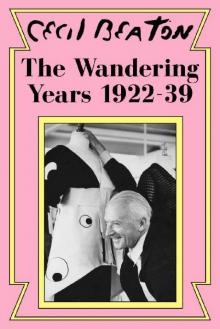 The Wandering Years (1922-39)
The Wandering Years (1922-39)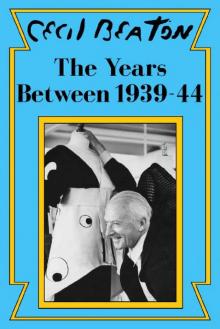 The Years Between (1939-44)
The Years Between (1939-44)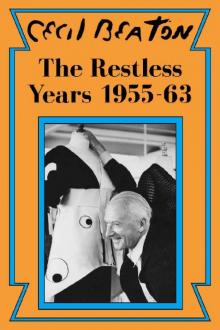 The Restless Years (1955-63)
The Restless Years (1955-63)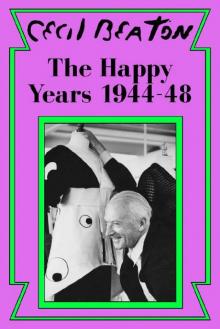 The Happy Years (1944-48)
The Happy Years (1944-48)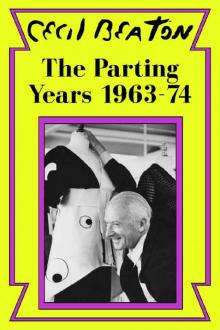 The Parting Years (1963-74)
The Parting Years (1963-74)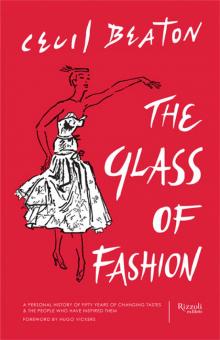 The Glass of Fashion
The Glass of Fashion